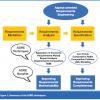|
Learning from Experience: Software Testers Need More than Book Learning People often point to requirements documents and process manuals as ways to guide a new tester. Research into knowledge transfer, as described in The Social Life of Information, suggests that there is much more to the process of learning. Michael Bolton describes his own experiences on a new project, noting how the documentation helped ... and didn't. |
||
|
Resistance Is Futile Why do so many people resist change, even when that change will be for the better? It's simple, really. Every change ends something, and endings mean loss. People don't like loss. Even the best changes mean something familiar will end. |
||
|
|
What's It Mean? ...Reducing Imprecision to Improve Verification Imprecise language makes understanding and, therefore, software verification more difficult. This article describes techniques for detecting and repairing vague and ambiguous software requirements. |
|
|
Navigating Conflict On good agile teams, conflict is frequent and viewed as normal. On great agile teams, conflict is constant and welcome as a catapult to high performance. What can we do to help teams chart their course through conflict so that it turns into a constructive force for greatness? |
||
 |
Understanding Software Performance Testing Part 1 Most people don't fully understand the complexities and scope of a software performance test. Too often performance testing is assessed in the same manner as functional testing and, as a result, fails miserably. In this four-part series we will examine what it takes to properly plan, analyze, design, and implement a basic performance test. This is not a discussion of advanced performance techniques or analytical methods; these are the basic problems that must be addressed in software performance testing. |
|
 |
Reloadable Test Data-O-Matic Reloadable test data takes more time up front (as compared to on-the-fly data creation), but saves blood, sweat, and tears in the long term. It also virtually eliminates "works on my machine" bugs, creates a more intricate and realistic environment, and is the first step on the road to test automation. |
Tanya Dumaresq
February 26, 2009 |
|
Off the Trails A focused approach toward testing a product is important, but sometimes we discover information that we didn't anticipate at all. One of the key skills in testing is dynamically managing our focus; sharpening it sometimes and widening it at other times. If we vary our approaches, we might find something surprising and broaden our coverage. |
||
|
The Missing Measurement In these times, many of us are being told to "do more with less." A more useful approach is "invest our organization's scarce resources where the return is the greatest." To do so, we must define the financial benefits sought when developing a system in addition to its requirements. |
||
 |
Building a Foundation for Structured Requirements: Aspect-Oriented Requirements Engineering Explained (Part 2) Aspect-oriented requirements engineering (AORE) is a new methodology that can help us to further improve the analysis, structure, and cost of development of software requirements. The second part of this two-part series focuses on the AORE specification techniques. |
Yuri Chernak
February 26, 2009 |
|
|
Lean Portfolio Management: Guiding IT Projects with Business Value Improving your software development process is only valuable if it fills the highest priority needs for your business clients with speed and quality. Lean principles provide guidance on how to create a structure that lets business priorities drive the selection of the right products for creation and enhancement. |
Guy Beaver
February 26, 2009 |
Pages
Upcoming Events
| Apr 27 |
STAREAST Software Testing Conference in Orlando & Online |
| Jun 08 |
AI Con USA An Intelligence-Driven Future |
| Sep 21 |
STARWEST Software Testing Conference in Anaheim & Online |
| Oct 27 |
STARCANADA Software Testing Conference in Toronto |








